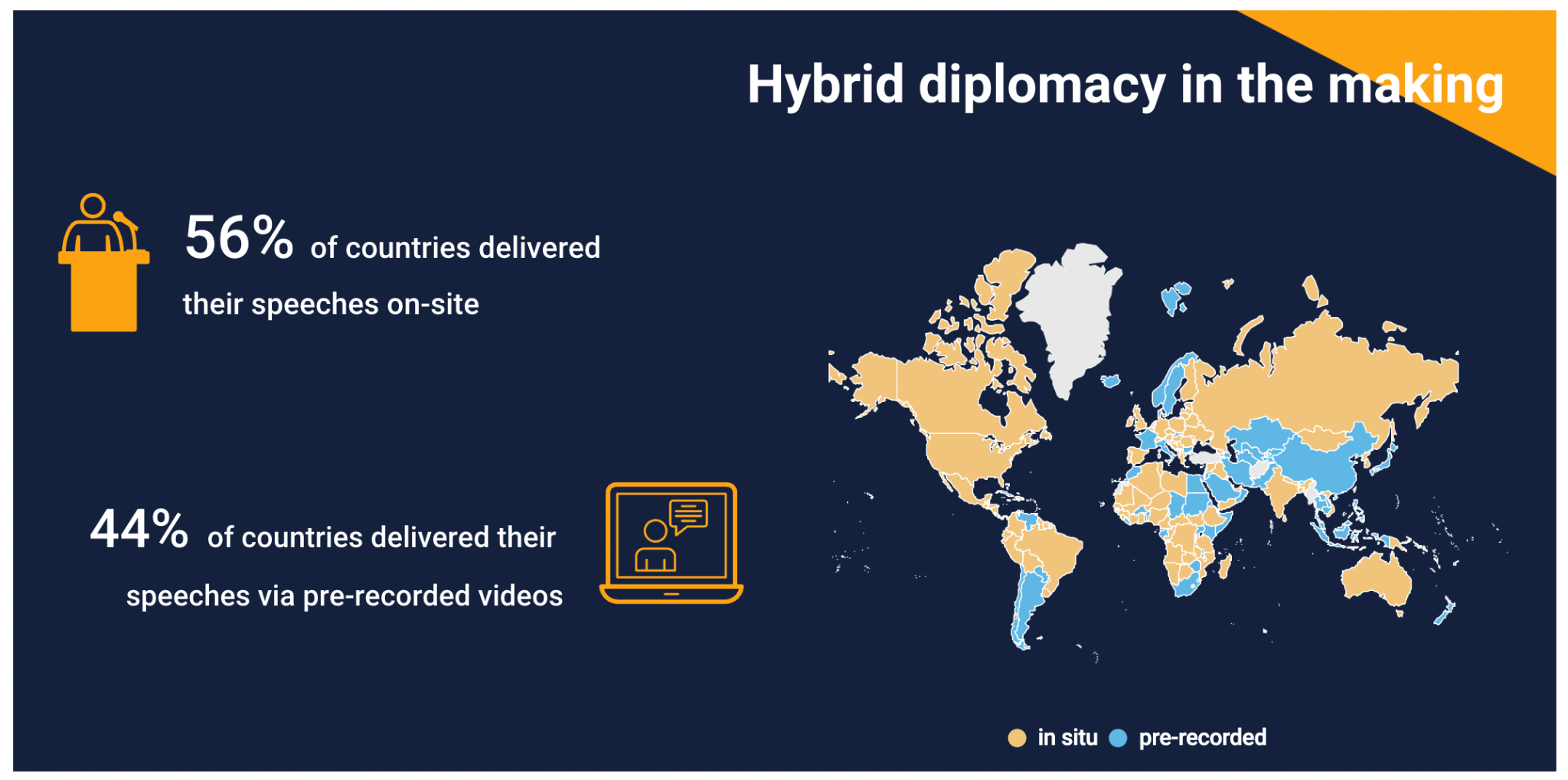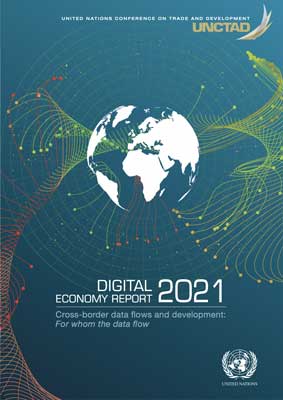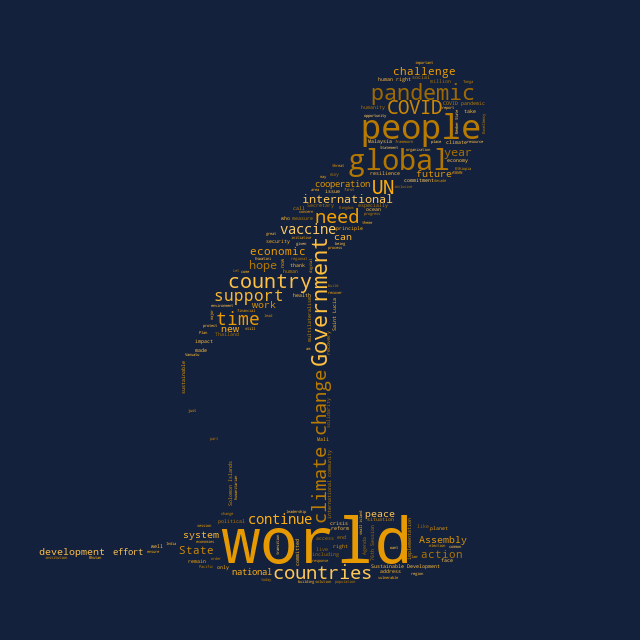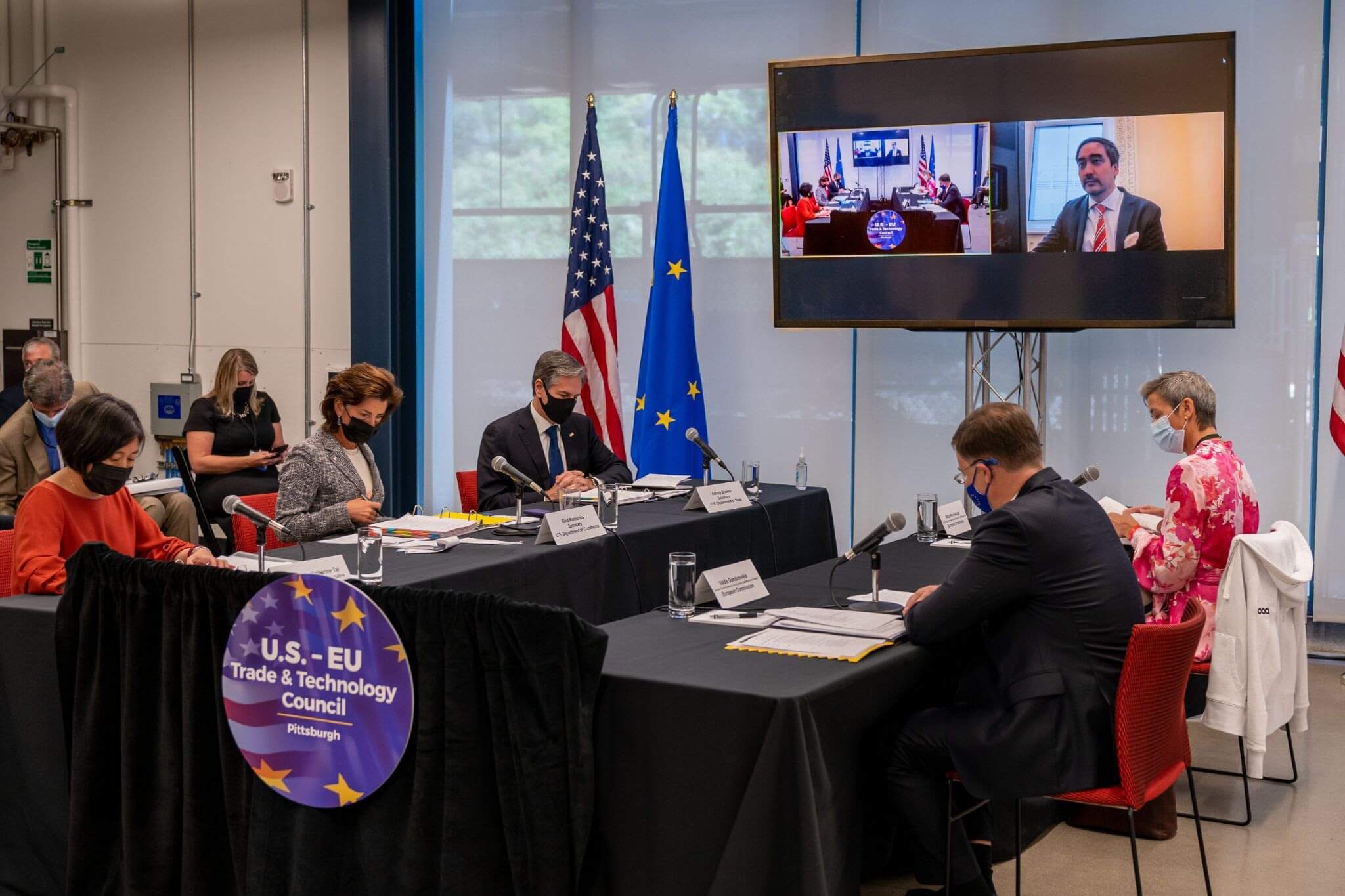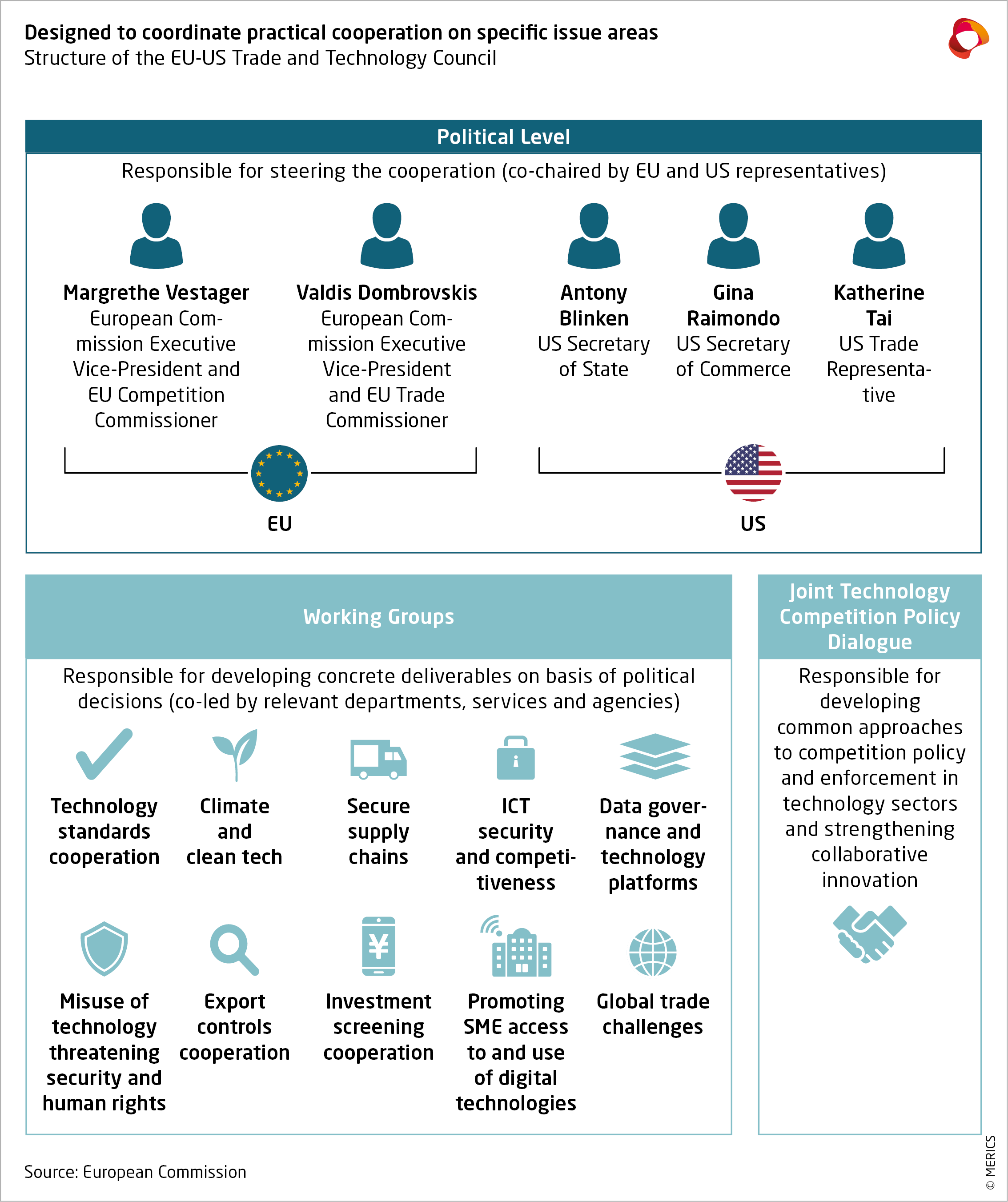Digital Watch newsletter – Issue 63 – October 2021
Download your copy
Accédez à la version française
TRENDING
Digital becomes mainstream
Every year in September, heads of state descend on New York City for the annual debate of the UN General Assembly, where digital issues are prioritised alongside other global challenges, such as poverty reduction, violent conflicts, and the climate crisis.
Yet, this year’s UNGA debate was quite different. World leaders talked a lot about the pandemic and climate change, but very little about technology and digital issues. Are they not as important anymore?
During the past 18 months, COVID-19 did more than just confine us to our homes. It pushed us to use the internet more than ever before. Wherever possible, employees were asked to work from home, teachers and kids moved to e-learning, and more shops went online. Suddenly, for many people around the world, online and offline merged into one.
The same likely happened to digital issues. World leaders talked about how to tackle the climate crisis, how to encourage vaccination efforts, and how to make an economic recovery from the pandemic. Digital technology was no longer a main solution, but lies at the heart of them.
This doesn’t mean that world leaders are going to drift away from discussing specific digital issues. There are still many concerns related to the use and misuse of technology (cybersecurity), the development of frontier technologies (AI, virtual reality), and the divide between those who use the internet and those who have no access.
Yet, for many people, ‘digital’ is now an integral part of life. For world leaders, a mainstream part of their solutions. It does not need to be singled out every time.
Future of work: On the path to a new normal
This time of the year marks the start of a new school year for young people, many go back to work after their summer vacations, and the diplomatic calendar renews. It’s therefore a good time to ask: What does the ‘big return’ look like – online, onsite, or hybrid?
Heads of state asked the same question in the lead up to the UNGA debate. Just over half of the world’s leaders travelled to New York. The rest delivered their speeches online. This could well be a reflection of how governments will approach ‘back to work’ as the pandemic continues to ebb and flow.
What about the tech industry? It seems that for many companies, it’s still early to reopen. When they do, many will opt for a hybrid version of work. Hybrid is the new normal.
LATEST
Countries agree to new OECD tax rules: How big tech companies will be impacted
A total of 136 countries have agreed to the OECD's new global corporate tax rules, which will affect big tech companies including Google, Apple, Facebook, and Amazon. Here’s what’s new in the landmark October agreement.
On 8 October, the majority of the world’s countries approved the so-called Statement on the Two-Pillar Solution to Address the Tax Challenges Arising from the Digitalisation of the Economy with a Detailed Implementation Plan, which updated and finalised the consensus that 131 countries reached in July.
As the name of the accord suggests, there are two tracks that were agreed to by each of the countries involved. The rules under Pillar One will ensure that profits from companies generating more than €20 billion in revenues are distributed more fairly among countries who are entitled to tax them. On the other hand, Pillar Two will ensure healthier tax competition among countries by capping the minimum corporate tax rate at 15%.
The agreement on Pillar Two – a cap of 15% – represents a significant change from the July agreement to tax companies at a rate of 'at least 15%'. This was a negotiating win for Ireland, which has maintained low taxes for years to attract global companies.
Some of the concessions made in the new tax accord brought holdouts into the fold – such as Ireland, Estonia, and Hungary – which is critical for the long-term success of the tax rules.
Just as critically, the countries involved developed a detailed implementation plan for both Pillars.
| Pillar One | Pillar Two |
|---|---|
| Early 2022 - Text of a Multilateral Convention (MLC) and Explanatory Statement to implement Amount A of Pillar One | November 2021 - Model rules to define scope and mechanics for the GloBE rules |
| Early 2022 - Model rules for domestic legislation necessary for the implementation of Pillar One | November 2021 - Model treaty provision to give effect to the subject to tax rule |
| Mid 2022 - High-level signing ceremony for the Multilateral Convention | Mid 2022 - Multilateral Instrument (MLI) for implementation of the STTR in relevant bilateral treaties |
| End 2022 - Finalisation of work on Amount B for Pillar One | End 2022 - Implementation framework to facilitate co-ordinated implementation of the GloBE rules |
| 2023 - Implementation of the Two-Pillar Solution | |
How Big Tech will be impacted
Here, we’re referring mostly to those companies generating more than €20 billion in revenue. It’s estimated that around 100 companies will fall into this category, including tech companies Google, Apple, Facebook, and Amazon.
These companies will need to pay taxes into a pool, from which countries can claim the revenue they’re entitled to based on a complex formula. Therefore, irrespective of how the tax pie will be shared among countries, companies will have to pay their share of tax on some of the profit they make.
Another impact is that companies will no longer be able to find refuge in tax havens. Obviously, there are still a lot of details to be worked out over the next few months. But as the OECD explained, added to previous work it carried out over the years, ‘the cumulative impact of these initiatives means that “tax havens” as people think of them would no longer exist.’
Read our full coverage on the Digital Watch observatory.
Ireland’s change of heart
Ireland knew that it would be difficult to continue resisting pressure from the over 130 countries backing the new OECD rules. The damage to Ireland’s reputation would have been significant. Yet, its low 12.5% tax rate was the cornerstone of its taxation policy.
What sweetened the deal enough for Ireland to sign on to the OECD’s rules is its win to establish a fixed tax rate. Ireland managed to negotiate the removal of the phrase ‘at least’ in the October text. The new tax rule, therefore, will be set at 15%, with no possibility in sight for increasing this rate.
Ireland also received assurances from the EU that the new directive (required under EU law to implement the OECD rules across EU countries) will not go beyond the OECD agreement. More importantly, Ireland’s current rate of 12.5% will also continue to apply to companies earning less than €750 million.
BAROMETER
Digital policy developments that made headlines
The digital policy landscape changes daily, so here are all the main developments from last month. We’ve decoded them into bite-sized authoritative updates. There’s more detail in each update on the Digital Watch observatory.
Global IG architecture
Digital issues were overshadowed by climate change and vaccine woes during the UNGA annual debate. The UN Secretary-General’s Our Common Agenda report warns of a stark choice on the world’s most pressing issues: Either breakthrough or breakdown.
The Australian, UK, and US (AUKUS) security partnership will cover cyber capabilities, AI, and quantum technologies.
‘Digital is the make-or-break issue’, European Commission President Ursula von der Leyen said in this year’s State of the Union address.
Sustainable development
UNCTAD launched the digital tool ‘The Wheel of Purpose’, to provide information on its initiatives related to the SDGs.
Security
The Wall Street Journal revealed that studies conducted by Facebook showed that Instagram has a negative impact on teenage girls. In a US Senate hearing, a former employee turned whistleblower testified that the company kept these studies to itself. Meanwhile, Facebook has put on hold its plans for a new Instagram app for children.
Russian internet company Yandex suffered what it described as the largest cyberattack in the country’s history.
Google temporarily blocked a number of Afghan government email accounts.
E-commerce and Internet economy
The US-EU Trade and Technology Council meets for the first time. Read our coverage on pages 8–9.
Amsterdam’s District Court ruled that Dutch Uber drivers are employees, not contractors.
The Epic vs Apple saga has ended: Apple must change its rules which have so far prohibited developers from steering users to alternative in-app payment systems. South Korea passed a new law banning app store restrictions. Meanwhile, the South Korean watchdog fined Google US$176.64 million for abusing its dominance in the Android OS market.
China’s central bank extended its cryptocurrency transactions ban to foreign companies.
El Salvador became the first country to adopt bitcoin as legal tender
Infrastructure
The European Commission proposed that phones and small electronic devices should have a universal charger. It also announced a new European Chips Act and a new Cyber Resilience Act.
Digital rights
Apple postponed its plans to roll out child safety measures.
The Irish Data Protection Commission (DPC) fined WhatsApp €225 million for failing to be transparent on how it uses data across partner services such as Facebook and Instagram.
The Italian and Irish DPCs are concerned about Facebook’s new smart glasses. The Irish DPC is also looking into TikTok’s processing of children’s data.
The latest Freedom House annual report finds the right to freedom of expression online is under unprecedented threat worldwide.
Content policy
An Australian court ruled that media companies are liable for defamatory content shared on their platforms.
Google and Apple caved in to pressure from Russia to remove opposition leader Alexei Navalny’s app Vote Smart from their respective app stores in the country.
Brazil’s Senate and Supreme Court blocked President Jair Bolsonaro’s decree limiting social platforms’ power to remove content.
Facebook’s Independent Oversight Board asked the company for more clarity on its review system for high-profile users.
Jurisdiction and legal issues
The Court of Justice of the EU said that certain unlimited data services offers by Vodafone and Deutsche Telekom in Germany breached European net neutrality laws.
Email service provider ProtonMail, known for its anonymity-focused service, was obliged to turn over metadata linked to a French climate activist to the Swiss authorities.
New technologies (IoT, AI, etc.)
The UN High Commissioner for Human Rights called for a moratorium on AI applications that cannot be operated in compliance with international human rights law.
In Japan, companies teamed up to form the Quantum Strategic Industry Alliance for Revolution. France and the Netherlands will cooperate on advancing research and fostering collaboration with the quantum industry.
#ICYMI: Data is distinct from conventional goods and services, says UNCTAD
UNCTAD’s latest report on the Digital Economy calls for a new governance model on data flows. ‘Rather than trying to determine who “owns” the data, what matters is who has the right to access, control, and use the data’.
DATA
UNGA 76: Unpacking the top digital policy priorities
From among all the issues raised by world leaders during their annual debate, three policy issues stand out. Here’s who said what.
1. Security of cyberspace, security in cyberspace
Slovenia highlighted the vulnerabilities that come from our dependence on the digital space and the damage cyberattacks can cause to critical infrastructure, the economy, and society. Australia noted that cyberthreats are among the main challenges we face today.
Germany and Belarus called out digital conflicts as a threat. Kuwait warned about the uncontrolled progress of modern technology and its ramifications for cybersecurity. For Cameroon, cybercrime is one of the scourges plaguing humanity and for the Ivory Coast, this is a transnational threat. Iceland highlighted how the complexity of modern conflicts has grown with the appearance of cyberthreats and disinformation.
Several countries, including Monaco and the Czech Republic, also referred to the growing rate of attacks against critical infrastructure. Croatia stressed the increasing threats against critical health infrastructure, especially in times of crises such as the COVID-19 pandemic.
In the face of these threats, the USA maintained its ‘right to respond decisively to cyberattacks that threaten our people, our allies, or our interests’.
In dealing with the growing militarisation of cyberspace, Russia advocated for countries to come up with ‘standard norms for state’s responsible behavior in the use of ICTs’ at the UN. Such a process should be based on ‘universal agreements allowing to examine any concerns in a transparent manner, relying on facts’.
‘Incidents of hacking, virus attacks, access and dissemination and misuse of information and network security can no longer be ignored,’ Samoa said. Together with Mauritius, Samoa also referred to the need for a UN-led process in drafting a new cybercrime treaty. Qatar spoke about the need for the UN to regulate according to the rules of international law, while Switzerland highlighted the work it is carrying out ‘to promote responsible state behaviour and the application of international law in cyberspace’ and its participation in ‘efforts to combat cybercrime’.
2. A ‘pandemic of fake news’
Disinformation is wreaking havoc, particularly on social media. Qatar dubbed misinformation a ‘pandemic of fake news’, while the Czech Republic and Comoros referred to the adverse effects of disinformation on citizen health, safety, and trust in institutions. Canada noted that the spread of systematic misinformation and propaganda created new risks and dangers for the digital age.
Israel spoke about the role of fake news in political polarisation, stating that ‘In a polarised world, where algorithms fuel our anger, people on the right and on the left operate in two separate realities, each in their own social media bubble, they hear only the voices that confirm what they already believe in. People end up hating each other. Societies – get torn apart.’
‘How much more fake news will we allow to be spread without states defending the public digital spaces?,’ Barbados asked.
Lithuania suggested a ‘holistic approach and concrete new ways to get better in detecting, analysing, and exposing disinformation’. Monaco said that a ‘fine balance remains to be found between, on the one hand, disinformation, hate speech, conspiracy theories and, on the other hand, respect for fundamental freedoms’.
3. Tackling the digital divide
Many countries called for urgent action to address the digital divide, including education reform. The risk of not tackling the issue will hamper the world’s ability to achieve the 2030 Agenda. As Singapore noted ‘the gulf of opportunities between digital haves and digital have-nots has also widened…if we do not close the digital divide, we will not achieve the sustainable development goals. That is why digitalisation poses a global challenge that requires a concerted global response.’
‘Today, we see some countries receiving a “digital dividend” while others suffer the consequences of a “digital divide”. […] Leaving no one behind today means leaving no one offline,’ Jamaica noted. The divide must be addressed with greater engagement of private and public sectors.
For Guatemala, narrowing the digital divide means educational reform. The pandemic exposed the unpreparedness of countries to shift to online, Eswatini said. Calling on the UN to rally support, Bangladesh stressed that ‘we need a global plan to prioritise education recovery by investing in digital tools and services, access to internet, and capacity building of teachers.’
Read our full coverage of the UNGA 76, data analysis tool.
Spotlight on: Our Common Agenda
The general debate of the 76th UNGA kicked off with a very passionate speech by UN Secretary-General António Guterres: ‘Our world has never been more threatened, and we have to make many crucial choices on what we face today such as peace and security, health, inequalities but even more what is ahead of us in terms of climate change and digital developments.’
His vision on how to make good choices is captured in Our Common Agenda, a report published in September featuring several proposals, such as the need for a renewed social contract and the protection of rights of future generations.
A handful of countries offered their suggestions on what Our Common Agenda should also include. Peru said the new social contract should make education universal, while Costa Rica said it should make welfare a circular good. Nauru thinks the agenda should also include the SDGs. Related to multilateral cooperation on digital issues, Singapore advocated for a new global digital architecture.
As for concrete actions, Sweden, in cooperation with Spain, has launched a network of leaders to help carry the agenda forward and is ready to support preparations for a ‘Summit of the Future’ in 2023, while Denmark hinted at a 2025 summit in Copenhagen, 30 years after the World Summit for Social Development it hosted in 1995.
Rebuilding a Western trade and tech alliance: Outcomes from Pittsburgh
The much-anticipated meeting between the USA and the EU to launch the US-EU Trade and Technology Council (TTC) turned a page in their partnership after years of rising tensions.
The 29 September meeting in Pittsburgh was part of renewed efforts between the Biden administration and the EU to work more closely together after four years of growing mistrust. The TTC will serve as a main diplomatic platform on tech and trade for the USA and the EU to work together and deepen their relations. The two agreed to sync their policy approaches in priority areas, coordinate their actions in international bodies, and partner with third countries to drive their shared policy goals.
The USA and the EU will also coordinate their approaches in areas such as the misuse of technology, information manipulation and interference, and digital connectivity. More importantly, albeit unsaid, the TTC will aim to counter China's rise in tech sectors and global trade, and will help fight unfair trade practices posed by ‘non-market economies’, which also alludes to China.
How will they do this?
The work of the TTC, to be carried out through ten working groups, includes expanding on the transatlantic trade and investment relationship between the USA and the EU, fighting the climate crisis, and protecting the environment.
When it comes to technology, there’s an equally ambitious agenda, which includes:
- On semiconductors: Strengthening domestic supply chains for semiconductors, without ending up in a subsidy race.
- On AI: Finding new ways to ensure the development of ‘trustworthy AI’, such as agreeing on technical solutions to ensure that AI systems do not produce biased results. Neither side is particularly keen on the other’s existing AI policy frameworks, but they have jointly expressed disdain over (China’s) AI social scoring systems.
- On tech platforms: As much as possible, agreeing on consistent measures for regulating illegal and harmful content, platform algorithms, and the ‘democratic responsibility’ of online intermediaries.
- On investment: Maintaining investment screening, that is, by excluding investments from portfolios based on environmental, social, and governance criteria for the purposes of national security (USA) and public order (EU). Both parties agreed on the principles of such screening, such as non-discrimination, transparency, accountability, and the need for enforcement mechanisms and partnerships with other countries and stakeholders.
- On export controls: Implementing export controls on dual-use items (technologies that have a civilian purpose, but can also be used for military purposes) noting that ‘the potential applications of emerging technologies in the defense and security field raise important concerns, and recognise the need to address these risks.’ The two are expected to hold prior consultations to ensure that the application of export controls is transparent and equitable for the US and EU exporters.
What’s not on the agenda (and why): Data flows
Inasmuch as data is central to tech issues, the TTC will not be dealing with data flows and privacy issues. Given that data flows is one of the main issues that the USA and the EU need to resolve, we have to ask why it’s not on the TTC’s plate.
POLITICO reports that ‘the EU doesn't want to include the privacy shield and data flows within the TTC umbrella’ based on sources who spoke on condition of anonymity. That’s because the EU looks at data flows from the perspective of users’ privacy, making it a human rights issue.
In order to tackle data flows, the USA and EU have a separate track for discussions, which are being led by US Commerce Secretary Gina Raimondo and European Commissioner for Justice Didier Reynders. So, what’s happening in the negotiations? It seems that Washington and Brussels are not yet seeing eye to eye.
The US Commerce Department is particularly keen on finalising a new framework, after the previous two mechanisms (the Safe Harbour and Privacy Shield agreements) were both struck down by the EU’s top court. It recently published a long list of reasons why a new data flow framework is essential, a message it reiterated right after the TTC’s inaugural meeting:
‘Even as the working group agendas are being developed, there are issues that fall outside the remit of the TTC that require immediate attention. Chief among these is restoring legal certainty to data flows between the US and EU.’
The issue was also raised by US President Joe Biden in a phone call with European Commission President Ursula von der Leyen last week.
From Brussels’ end, although it also wishes to have a new framework, it wants to save the third deal from undergoing a similar fate to its predecessors. This means requesting of the USA much stronger assurances that the privacy of European citizens will be safeguarded. Until the USA tackles the issues identified by the Court of Justice of the EU – protection from prying eyes and effective redress – there’s no end in sight.
IN FOCUS
Too big to break; too big to fail
Facebook has long faced scrutiny over its market dominance. Together with a handful of other tech giants, the company’s huge growth and influence is a headache for antitrust regulators. Yet, when Facebook, WhatsApp, and Instagram went dark for a few hours in early October, we were reminded how dependent we are on these services.
For the millions of users who rely on these services as their main communication tool, the outage on 4 October meant an annoying 6 hours of waiting until the services resumed. But for some users, it could have been a matter of life and death.
Whatever the reason for the outage, the world needs a better explanation from Facebook. The outage also raises two important issues. The first is the cascading effect on other areas like e-commerce and education, and the realities that communities such as Pakistani off-grid villages face whenever services are down, threatening their livelihood.
The second is the concentration of millions of users on just a handful of services. Although this is partially the result of network effects (when you opt to use a service because all of your friends are using it), fierce competition that eliminates the smaller players contributes to a market dominated by just a few.
This triggers a host of other questions: If we depend on these companies as we depend on water and electricity services, shouldn’t we have the same rules for tech platforms? Should platforms be obliged to guarantee their services (against a fee), instead of promising their best efforts? Could data portability strengthen our right to digital self-determination?
For some of these issues, there are already frameworks in place. For instance, the EU’s General Data Protection Regulation already provides users with the right to data portability. For other issues, however, it requires a major conversation on the role services provided by private companies should (be allowed to) have in our lives. There might come a time when governments ask Facebook for more than just a better explanation.
Factbox: How did Facebook go down?
In simple terms, Facebook and its services Whatsapp, Instagram, and Facebook Messenger removed itself from the internet. It’s like they were locked out of their own apartment.
The solution was to fly people to California to physically sit down with the servers and routers and change what are known as the Border Gateway Protocol (BGP) settings that interfered with Facebook’s connectivity.
There are four possible scenarios that led to Facebook’s longest downtime ever: A simple technical mistake, a disgruntled insider (reacting to the whistleblower’s evidence?), a cyberattack, and an intentional outage. Watch our analysis.
GENEVA
Policy updates from International Geneva
Many policy discussions take place in Geneva every month. In this space, we update you with all that’s been happening in the past few weeks. For other event reports, visit the Past Events section on the GIP Digital Watch observatory.
Data Economy: Human centric approach at the forefront | 22 September 2021
The event discussed the data economy and its implications for countries, companies, and citizens. In particular, panellists considered the current data privacy regulations in light of a human-centric approach – i.e. how to reconcile protecting privacy and data management practices with innovation and economic growth. The event was organised by the Permanent Delegation of the EU to the UN in Geneva, the Permanent Missions of Slovenia and Switzerland to the UN in Geneva, and the Geneva Internet Platform.
GGE Lethal Autonomous Weapons Systems discussions | 24 September – 1 October
The second session of the 2021 Group of Governmental Experts (GGE) further debated the human element in the use of lethal force and aspects of human machine interaction in the development, deployment, and use of LAWS. The GGE also reviewed the potential military applications of related technologies.
WTO Public Forum | 28 September – 1 October 2021
The 2021 Public Forum, themed Trade Beyond COVID-19: Building Resilience, discussed the effects of the pandemic on trade and how the multilateral trading system can help build resilience to COVID-19 and future crises. The Public Forum sessions were grouped into three main themes: enhancing resilience beyond COVID-19, strengthening the multilateral trading system, and collective actions towards sustainable trade. Read our session reports.
UN World Data Forum | 3–8 October 2021
The third UN World Data forum brought together representatives of different sectors working with data to achieve the 2030 Agenda. The discussions were grouped into five different thematic areas: new approaches to capacity development for better data, innovations and synergies across data ecosystems, leaving no one behind, understanding the world through data, and building trust in data and statistics. Participants and speakers also took stock of what has been achieved so far when it comes to implementing the Cape Town Global Action Plan for Sustainable Development Data.
Covering digital in the media: What are the stakes? | 30 September 2021]
The discussion, organised as part of the 12 Tours of Digital Geneva series, brought together panellists to discuss how digital issues are covered by traditional media and how journalists can explore digital developments in depth without falling into the hype trap. Discussants debated the challenges faced by journalists when reporting digital news. First, there is the need to strengthen journalists’ capacities when it comes to digital topics and expertise. Second, it is important that journalists delve deep into the intricacies of digital. Moreover, the speakers considered International Geneva’s visibility outside the local scene. Despite being the place where more than 50% of global digital policy discussions take place, International Geneva’s richness is still not fully visible abroad. Read the full event report.
UPCOMING
Upcoming global policy events: Are you tuned in?
Learn more about upcoming digital policy events around the world.


